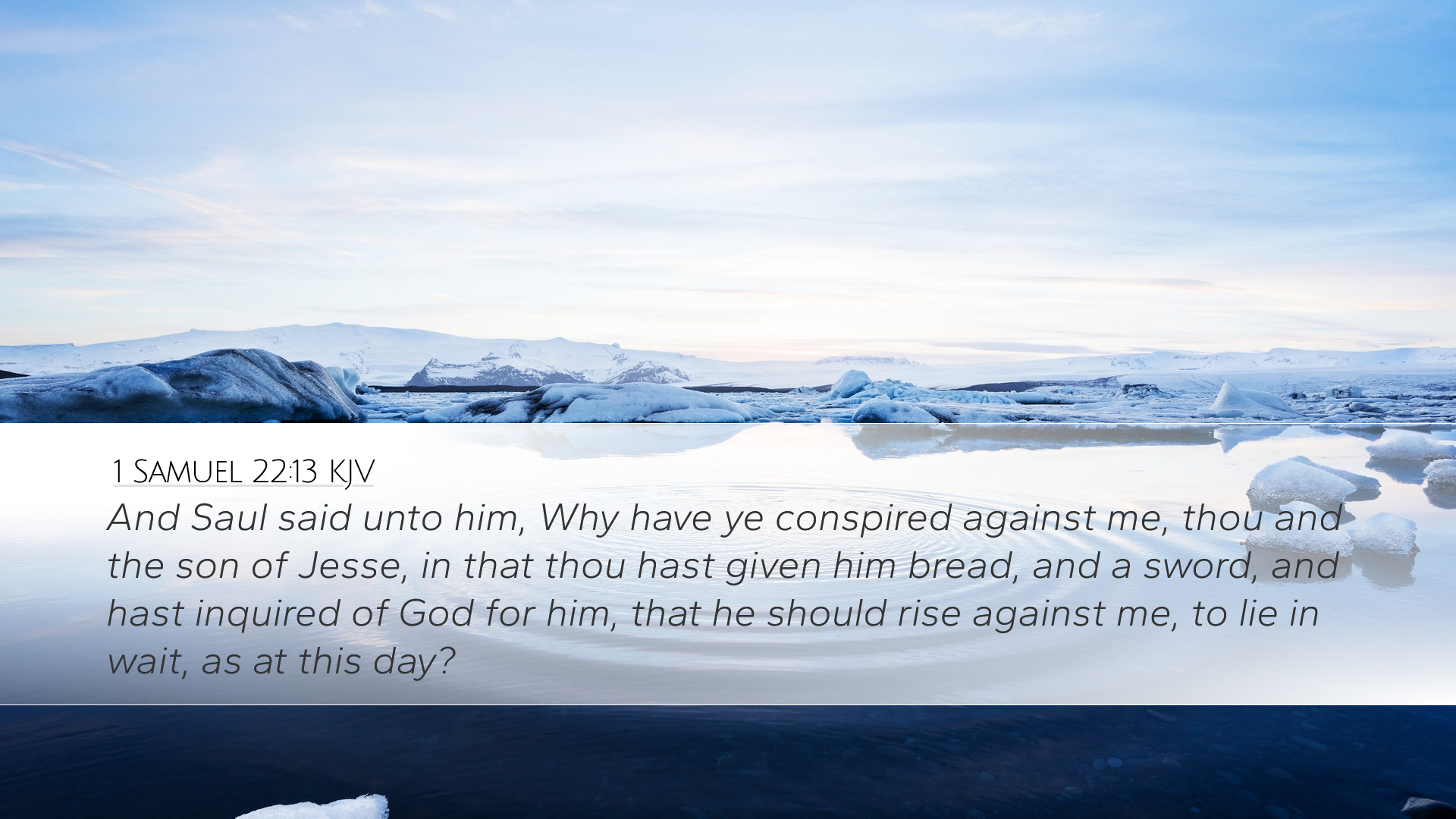Commentary on 1 Samuel 22:13
Bible Verse: 1 Samuel 22:13 (KJV) - "And Saul said unto him, Why have you conspired against me, thou and the son of Jesse, in that thou hast given him bread, and a sword, and hast enquired of God for him, that he should rise against me, to lie in wait, as at this day?"
Introduction
This verse captures a critical moment in the narrative of 1 Samuel, highlighting the tension between King Saul and David. The verse showcases Saul's paranoia and escalating hostility towards David, who is portrayed as a rising threat to Saul’s kingship. For pastors, theologians, and scholars, this passage invites a deeper exploration of themes such as betrayal, loyalty, and divine providence.
Contextual Background
The context of this exchange is essential to understanding its implications. David has fled from Saul, who is consumed by jealousy and fear. Saul’s accusation against Ahimelech, the priest at Nob, who provided David with sustenance and a weapon, is indicative of Saul's desperate grasp on power and his transformation into an antagonistic figure.
The Rise of David
David, anointed by Samuel, represents God’s chosen servant. His increasing popularity and prowess lead Saul to view him as a rival. This moment illustrates not only Saul's perverse interpretation of David’s actions but also the profound sense of betrayal Saul feels as he believes his own subjects are turning against him.
Commentary Insights
Matthew Henry's Commentary
Matthew Henry emphasizes the irrationality of Saul’s accusations. He notes that Saul’s descent into paranoia blinds him to the truth that David had not conspired against him. Henry suggests that this moment serves as a vivid illustration of how fear can distort reality and lead to unmerited persecution. Saul’s demand for accountability reveals his instability and desperation, as he wrongfully assumes that others share his treachery.
Albert Barnes' Notes
Albert Barnes provides insights into the character of Saul and the dynamics of his leadership. He posits that Saul's inquiry reflects not only a personal affront but a sovereign concern as he perceives a threat to his reign. Barnes highlights the gravity of Saul’s words, which call into question the loyalties of his subjects and the integrity of priests who assist David. This tension serves as a moral backdrop, illustrating the consequences of a leader driven by fear rather than faith.
Adam Clarke's Commentary
Adam Clarke’s commentary delves into the implications of Saul's actions on the worship and service of the priests. He argues that Ahimelech’s assistance to David signifies a higher moral ground, where loyalty to God outweighs loyalty to a tyrant. Clarke stresses that Saul’s accusations are not merely personal grievances; they are an assault on the very notion of divine alignment and support. He thus demonstrates that Ahimelech's actions were a fulfillment of God’s will, diverging from the depraved leadership of Saul.
Theological Themes
- Betrayal and Loyalty: This verse highlights the complexities of allegiance and the nature of betrayal. Saul’s perception of conspiracy unveils his insecurities and the fragility of his power.
- Leadership and Accountability: Saul’s inquiry into the actions of his followers raises questions about the responsibilities of leaders and the weight of their suspicions.
- Divine Providence: The underlying theme suggests that God’s hand is at work, even amidst wrongful persecution. David’s rise is framed within the context of divine purpose, contrasting Saul’s misrule.
Practical Applications
For contemporary readers, particularly for pastors and church leaders, this passage offers significant lessons:
- Responding to Persecution: Just as David remained faithful amid Saul's accusations, believers are encouraged to trust in God's plan during times of unjust treatment.
- Discernment in Leadership: Leaders are reminded to seek God’s guidance in their decisions, avoiding the pitfalls of paranoia that can skew judgment.
- Emphasizing Loyalty to God: The story calls for an unwavering commitment to God’s purpose over human authority, as exemplified by Ahimelech’s support for David.
Conclusion
1 Samuel 22:13 is a rich, multifaceted verse that reveals the turmoil resulting from Saul's deteriorating kingship and David's emerging destiny. Through the insights of established commentators, one can grasp the complex interplay of fear, loyalty, and divine guidance. Ultimately, it serves as a reminder that God’s sovereignty prevails in the narratives of human conflict, inviting believers to find hope and purpose even when facing adversity.


